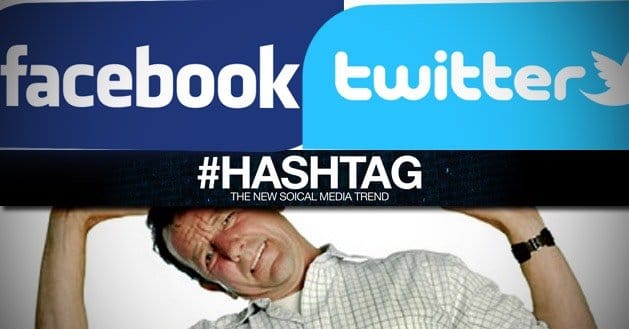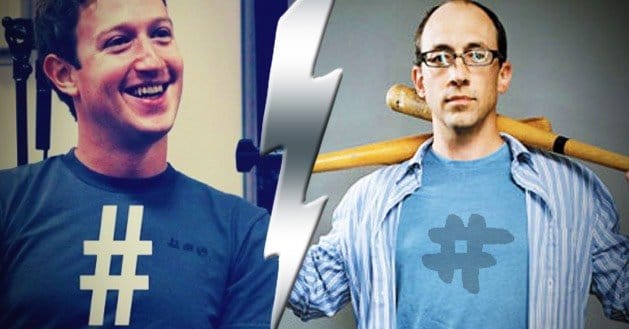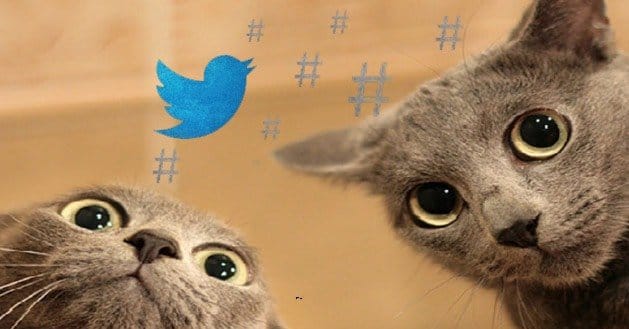 Written by ContentPowered.com
Written by ContentPowered.com
Twitter has contributed much to the modern web, and many of its social features have changed how people view social media. While Facebook remains the most popular online platform, Twitter has been a feisty competitor, and it doggedly remains a popular platform despite Facebook’s tremendous growth. Of all that Twitter has given the world of social media, its hashtags might be most important.
However, Facebook has recently begun supporting hashtags as well, and many are curious about what this means for the future of both Twitter and Facebook. Here are a few of the reasons why hashtags are so popular and what Facebook’s adoption of them means for the future of social media on the Internet.
Twitter: Birth of the Hashtag
When Twitter was first launched at a conference, attendees viewed it as a revolution. Instead of having to wait for news stories or blogs to post information, they could simply access information from their online contacts. Users could share information quickly, and the ability to retweet information allowed important developments to spread in minutes. However, the platform was somewhat chaotic; how would users search for information when there was so much of it?
The answer to this problem was hashtags. Twitter users often want to know what people they aren’t following are saying, and hashtags allow people posting on particular topics to mark their posts. Twitter’s interpretation of “social” in social media emphasizes users interacting with people they might not know it real life. Hashtags made communication far simpler, and they are a cornerstone of the platform today.
Facebook: A Different Kind of Platform
To form a friendship in Facebook, both users have to approve. While it is possible to follow someone without them following you back, many users only post to people they’re friends with. This makes Facebook a more insular platform, and communication work differently than it does on Twitter.
Facebook users use it to stay in touch with real-life contacts. People use it as a means of keeping up with friends they had in the past, and many view it as a means of updating friends about life events. It is certainly a popular platform for discussing news, sports and other event, but it is social in a different way. Because of this, Facebook’s hashtags have been less popular than their counterparts on Twitter. In fact, those who’ve looked at what posts goes viral on Facebook have found them to have little impact.
Is Facebook Changing?
Some have stated that Facebook has become a bit stale in recent years. While nobody is predicting a MySpace-style implosion, some feel that the platform will have trouble growing. Instead of checking religiously, users might check out what their contacts are doing once a day or a couple of times during the week. Facebook changes have been rather unremarkable in recent years. Do hashtags represent a change in the way Facebook will work?
In a sense, hashtags represent the next step in a change Facebook has been keen to implement for years. Facebook employees want the platform the become users’ primary conduit to the rest of the Internet. Facebook offers search functionality, and they want people who head to Google to instead head to Facebook. As an extension of this effort, they also want people to use their hashtags when looking for the “social media” pulse. Facebook views Twitter as a serious competitor, and they want to leverage their larger base of users to take the wind out of Twitter’s sails.
Facebook’s adoption of hashtags should not be viewed as a sign of a fundamental revolution but as one of many incremental steps the platform has been taking and will continue to take in the coming years. The basic experience should not be affected.
Facebook users rarely use hashtags, and those who use them generally do so in a humorous manner. Part of this is due to the fact that Facebook users aren’t generally looking to connect with anyone aside from their followers. Hashtags are great for reaching out to people you might not be in contact with, and Facebook users tend to have little interest in reaching out beyond their existing contacts and people they meet offline.
That said, Facebook’s push to offer more Twitter-like functionality has a chance at success. Facebook has far more users, and even a small percentage of them using hashtags could cause others to try them out as well. In addition, offering a more organized way to read what others say could spur more popularity. Early reviews have not been positive, but there is still time to change, and Facebook will not give up on hashtags in the near future.
When discussing Twitter’s hashtags, many people treat them as static elements that have changed little over the years. In reality, Twitter’s hashtags have evolved, and they are now used in more inventive ways.
Twitter users still use hashtags when discussing live events. For example, sports games will typically have a certain hashtag associated with them, and users will append it to appropriate Tweets. However, the “Tending Now” section of Twitter is now being used as a platform for engaging in online discussions.
People might not otherwise care about a particular news event. If it trending, however, they might offer their own opinions and engage in conversations with others. Some of these discussions are informative; others can become contentious. All of the discussions between strangers, however, are rare on Facebook, and they help separate Twitter from the competition.
In the early days of Twitter, some questioned whether hashtags would remain on Twitter or if the platform would even last. While some still view hashtags as a fad, most believe they won’t go away in the foreseeable future and might even become more popular.
Hashtags are a powerful tool for social media platforms, and their ability to tag posts makes them a great tool for reaching out to others. While new technologies might offer more functionality, users also seem to enjoy hashtags, and its hard to imagine a social media future without them.
The Internet is constantly evolving, and social media has dramatically changed how society views and uses it. While new technology promises to further supplement the Internet and provide new ways to use it, there is little doubt that social media will remain a popular part of the modern Internet experience.
Twitter is often viewed as the other social media platform, but it offers a different experience when compared to Facebook. While both platforms offer many of the same features, people use them in entirely different ways. The Twitter hashtag is one of the most popular and powerful features of the platform, and it will remain so for the indefinite future. However, it is less useful on platforms like Facebook that target different kinds of connections.
Still, Facebook would love to have Twitter’s users, and Twitter would certainly love to take some of Facebook’s many users. There is little doubt that both platforms will offer new features to target those who primarily use competing platforms. Whether Facebook’s adoption of the hashtag represents a significant change is yet to be seen, but there is little doubt that they will push for more Twitter-style communication.


